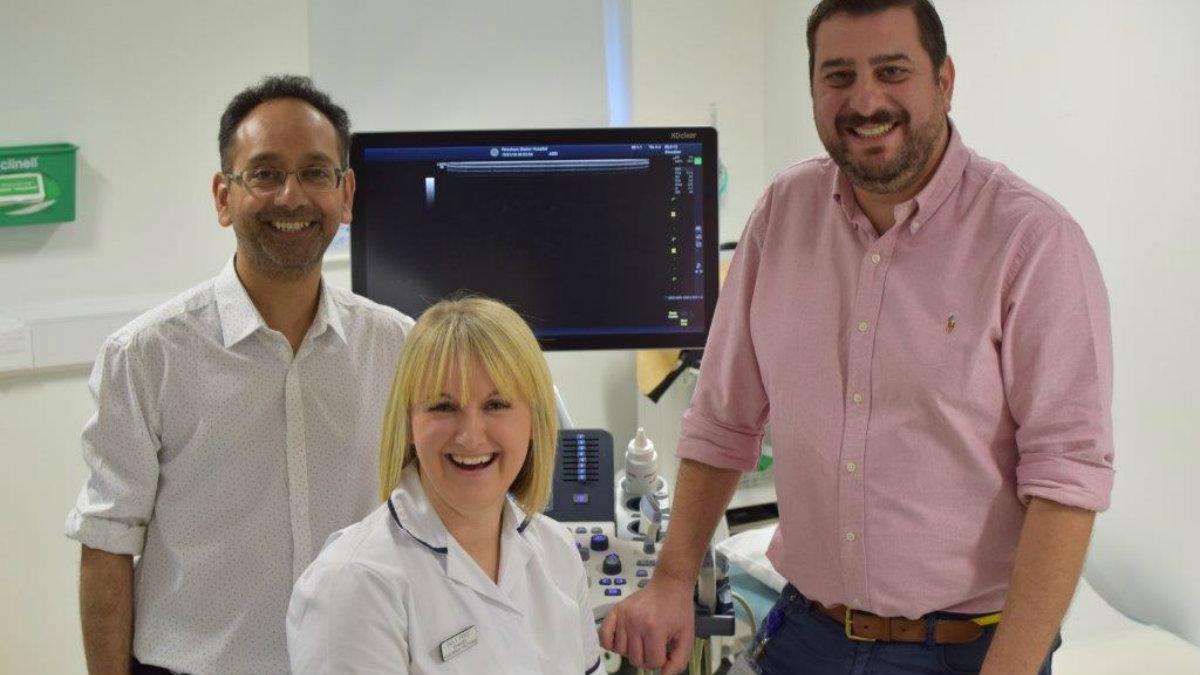Sally Priest, advanced physiotherapy practitioner, is blazing a trail at Betsi Cadwaladr health board by completing her training to provide patients with ultrasound-guided steroid injections.

Pictured in Wrexham Maelor’s radiology department: physio Sally Priest (centre); consultant radiologist Himanshu Patel (left); and Dr Makarious Asprou, a local GP who works with CMATS
She has been injecting as part of her practice at Wrexham Maelor Hospital in north Wales since 2007, but said the benefit of using ultrasound was increased accuracy.
‘If patients have had previous injections which have not been beneficial, ultrasound can help deliver a more positive outcome,’ she said.
Since 2017, Mrs Priest has been independently scanning patients with shoulder pathologies, such as rotator cuff tears, tendinopathy and bursitis. She is the only physiotherapist at Betsi Cadwaladr qualified to provide this treatment.
Although she uses the scanner in the hospital’s radiology department, the aim is for her department, the orthopaedic clinical musculoskeletal assessment and triage service (CMATS), to get its own equipment.
‘Our CMATS clinic wants to offer a “one-stop shop” where patients are assessed and scanned in one appointment,’ she said.
‘The health board has made a bid for £85,000 in charitable funds for an ultrasound machine in the clinic, and we have a meeting in a couple of weeks when we will find out whether they will support it or not.’
Reduced waiting times
Meanwhile, Mrs Priest said that by scanning shoulders in the radiology department, she is already reducing the number of appointments patients need. But a new scanner in the CMATS clinic will also cut demand on radiology services.
She said that a review of Wrexham Maelor’s CMATS clinic had reduced the waiting time to zero. A year ago, patients waited an average of 14 weeks for an appointment, and in November 2016 faced a typical wait of 32 weeks.
‘We got this down through increasing staffing levels, and redesigned the format of clinics to make sure appointments were fully utilised,’ she said.
‘Previously staff would work across two sites. But we have kept them within the CMATS clinic, cutting travelling time and using their working hours more effectively.
‘Also, our clinic is now open 8.00am-6.00pm Monday to Friday. We have extended the day, and patients who are working have more flexibility to attend appointments.’
Gaining experience
In 2015, Mrs Priest completed a master’s module in dynamic ultrasound scanning at Keele University. She then worked alongside the hospital’s consultant musculoskeletal (MSK) radiologist to gain the required experience and competencies.
She said that physiotherapists who are interested in adding ultrasound to their practice should do two things. Firstly, to identify the appropriate training. Secondly, to liaise with a MSK radiologist or stenographer, about supporting them through their training.
Number of subscribers: 0